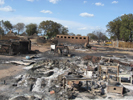
As UN Dispatch noted this morning, it is a big week for Sudan. On Wednesday, the Abyei Arbitration Tribunal in The Hague is set to announce its much-anticipated decision on the disputed boundaries of Abyei— an oil-rich and contested region along the disputed North-South border within Sudan.
The flurry of news on Abyei over the weekend demonstrated both the importance ascribed to the ruling inside Sudan and the tenuous nature of the Abyei dispute, which the International Crisis Group has called “the most volatile aspect” of Sudan’s 2005 Comprehensive Peace Agreement, or CPA.
Here’s a rundown of the latest on Abyei from the past several days:
- On Saturday, the Sudan Tribune reported that members of the SPLM and the NCP, the two parties to the CPA, had met in Khartoum to “discuss a number of issues surrounding the CPA in preparation for the upcoming Abyei ruling.” In recent weeks, both sides have repeatedly expressed their commitment to abide by the ruling. The U.S. State Department issued a statement last week urging the parties to prepare for the implementation of the ruling and pledged, along with other CPA “guarantor” nations, to “assist as appropriate with its implementation."
- The biggest news on Abyei this weekend was a statement of concern from Ashraf Qazi, the head of the U.N. Mission in Sudan, regarding reports of the South’s SPLA forces gathering in Agok, an area south of Abyei. According to a U.N. statement, Qazi called the SPLA’s alleged action “a clear violation of the Abyei Roadmap Agreement” and warned that it “could lead to escalation and violence if it remained unchecked."
- However, today, as the clock ticks toward Wednesday’s ruling, Mr. Qazi issued another statement saying that he was "reassured" that the South’s army had taken measures to remove soldiers from the contested Abyei area. It is interesting that Mr. Qazi only condemned the reported presence of SPLA forces in the Abyei region, because there have also been reports from the ground of northern “oil police” amassing at and just inside of the current “Abyei Roadmap” boundaries referenced above.
- Another not-to-miss source on Abyei is this helpful Reuters Q and A, which breaks down some of the key political issues underlying the Abyei dispute:
"On one level, this is an argument about how much North Sudan stands to lose if Abyei joins the South, especially if southerners, as is widely expected, also choose secession [in the 2011 southern referendum]."
Today, Enough released a strategy paper arguing that how each side responds to the Abyei ruling will be the first major test of recent commitments made in Washington by the two parties to the CPA. In “Abyei: Sudan’s Next Test,” Colin Thomas-Jensen and I wrote that:
"If the Abyei dispute relapses into stalemate and violence, the already fragile CPA will be pushed to the breaking point."
I agree with the U.S. Institute of Peace’s Jon Temin in his AllAfrica.com op-ed today:
"What happens in Abyei in the coming days and weeks will be a harbinger of things to come in Sudan’s complex political future, for it will give an indication of whether the ruling parties of north and south Sudan can bridge their differences peacefully in the future."
Finally, Kenya’s Daily Nation argues that “direct combat” between the North’s Sudan Armed Forces and the South’s Sudan People’s Liberation Movement immediately following the tribunal’s ruling is unlikely, but that proxy fighting between militias sponsored by the two armies is a real possibility.
There is sure to be a great deal more to come on Abyei this week, and we will keep you posted on the breaking developments. You can also watch the webcast of the announcement live beginning at 10 am in The Hague (GMT +2).

